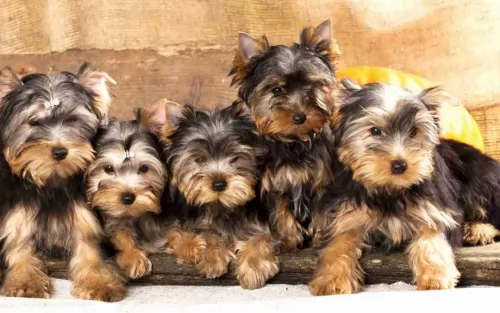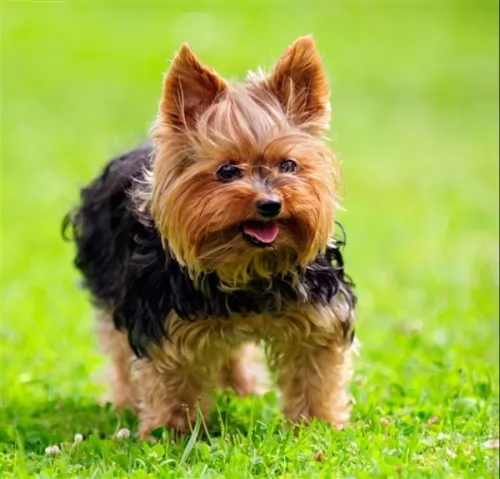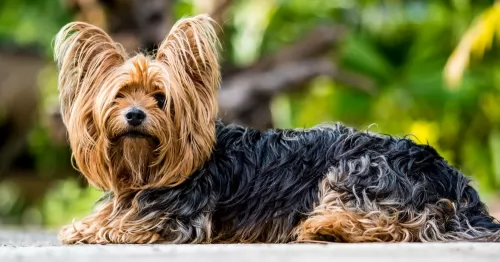 Petzlover
Petzlover Yorkshire Terrier is originated from United Kingdom but Wheaten Terrier is originated from Ireland. Yorkshire Terrier may grow 27 cm / 10 inches shorter than Wheaten Terrier. Yorkshire Terrier may weigh 17 kg / 37 pounds lesser than Wheaten Terrier. Yorkshire Terrier may live 3 years more than Wheaten Terrier. Yorkshire Terrier may have less litter size than Wheaten Terrier. Yorkshire Terrier requires High Maintenance. But Wheaten Terrier requires Moderate Maintenance
Yorkshire Terrier is originated from United Kingdom but Wheaten Terrier is originated from Ireland. Yorkshire Terrier may grow 27 cm / 10 inches shorter than Wheaten Terrier. Yorkshire Terrier may weigh 17 kg / 37 pounds lesser than Wheaten Terrier. Yorkshire Terrier may live 3 years more than Wheaten Terrier. Yorkshire Terrier may have less litter size than Wheaten Terrier. Yorkshire Terrier requires High Maintenance. But Wheaten Terrier requires Moderate Maintenance
 The Yorkshire terrier originated in Yorkshire which is a place in northern England. In mid 19th century workers from Scotland came to Yorkshire in search for work. They brought different varieties of small terriers with them. Earlier they are known as Broken Haired Scotch Terrier and then Toy Terrier. In 1874 they were officially named as Yorkshire Terrier. They begun their journey as hunting dogs and later developed as companion dogs. AKC registered the breed in 1878.
The Yorkshire terrier originated in Yorkshire which is a place in northern England. In mid 19th century workers from Scotland came to Yorkshire in search for work. They brought different varieties of small terriers with them. Earlier they are known as Broken Haired Scotch Terrier and then Toy Terrier. In 1874 they were officially named as Yorkshire Terrier. They begun their journey as hunting dogs and later developed as companion dogs. AKC registered the breed in 1878.
 The dog was bred to be a useful dog to have around the farm. He was needed to help with the guarding and herding of livestock and to keep the rat population down.
The dog was bred to be a useful dog to have around the farm. He was needed to help with the guarding and herding of livestock and to keep the rat population down.
This little dog has a long history, but in spite of this, he wasn’t recognized as a breed in his home country by the Irish Kennel Club until 1937.
It was in 1943 that the Wheaten was recognized by the British Kennel Club. They were exported to the United States in the 1940s and recognized by the American Kennel Club in 1973.
 Yorkshire terriers are one of the glamorous member of the dog breeds. They have excellent personality as their owner will be surely proud of them when taking them in public. They like to go outside and make adventures. They are good companion dogs and watch dogs too. They are very affectionate with their owners. Yorkies always bark when any stranger comes and they should be taught about neighbours and when to bark. They will get angry on seeing new dogs and surely chases squirrels.
Yorkshire terriers are one of the glamorous member of the dog breeds. They have excellent personality as their owner will be surely proud of them when taking them in public. They like to go outside and make adventures. They are good companion dogs and watch dogs too. They are very affectionate with their owners. Yorkies always bark when any stranger comes and they should be taught about neighbours and when to bark. They will get angry on seeing new dogs and surely chases squirrels.
They like to spend more time with their people. Leaving them alone for long time is not good. Yorkshire terrier should be treated gently and with love. They love to spend time with older children. They love apartment life if they are made to play and walk daily. Yorkies are the second most popular dog in America.
 The Wheaten Terrier is a robustly built, medium-sized dog with males and females standing at between 43 to 50cm in height and weighing between 13 to 20kg.
The Wheaten Terrier is a robustly built, medium-sized dog with males and females standing at between 43 to 50cm in height and weighing between 13 to 20kg.
The soft, single coat is a silky texture and a wheaten, gingery color. A bonus is that the coat doesn’t shed much. Puppies are born with darkish coats of a reddish-brown color but the coat lightens significantly as the puppy grows older.
Most Wheaten Terrier owners opt to have the dog professionally groomed. Their tails have always been docked.
Your Wheaten Terrier is a smart dog, albeit headstrong and stubborn. His intelligence makes it easy to have him trained.
They love their human family and aren’t known for any aggression issues. They’re energetic, playful dogs and are sometimes even looked upon as being hyperactive. They’re able to get along well with other dogs and cats in the house. They generally make great family pets.
These dogs are well suited to life in the city as well as the countryside just so long as he gets his daily walks and other forms of exercise.
 Yorkshire terrier are not so much friendly with children. It is not advised to leave them with children without adult supervision.
Yorkshire terrier are not so much friendly with children. It is not advised to leave them with children without adult supervision.
They were previously used to catch rats and hunt badger and fox. They are excellent watchdogs and defend their territory very well.
They adapts well for apartment living. But they will not be happy if leaved alone for a long time. Yorkies cannot tolerate too hot or cold weather.
They are moderately easy to train. Yorkshire terrier should be trained early when they are amenable to process. Sessions should be conducted with lots of treats and must be short as they will easily get bored.
 The Wheaten Terrier is such a bouncy, lively little dog that he brings joy into any home.
The Wheaten Terrier is such a bouncy, lively little dog that he brings joy into any home.
He is energetic, playful and full of the joys of living but you don’t want to take advantage of his good nature.
Don’t leave him stuck in your back yard but include him in all your family activities. He’s your best friend, providing you with unconditional love that few humans can equal.
 Your Wheaten Terrier is a dog breed that can live healthily with you for a good number of years.
Your Wheaten Terrier is a dog breed that can live healthily with you for a good number of years.
Just like most other dogs, they are prone to some heritable diseases. Perhaps a condition to look out for with this particular dog is protein wasting conditions - protein-losing nephropathy (PLN) and protein-losing enteropathy (PLE).
Both of these diseases are actually fatal but if caught early enough, they can be managed with dietary changes and medication.
Your dog produces proteins known as enzymes, one group being digestive enzymes that help with the breakdown and digestion of food. When your pet battles with malabsorption, digestive enzymes don’t absorb protein and it passes through the large intestine into the faeces. Your dog will have inflammatory bowel disease.
 For English bull dog puppies, When you change the puppy food from liquid to solid initially you must give what the dam is having. This is to avoid digestive problems when new food is introduced. The level of liquid food should be reduced in a step by step manner and thus increasing solid food gradually.
For English bull dog puppies, When you change the puppy food from liquid to solid initially you must give what the dam is having. This is to avoid digestive problems when new food is introduced. The level of liquid food should be reduced in a step by step manner and thus increasing solid food gradually.
You have two choices and one is manufactured dog food and another is home cooked food. Commercial brands are not suggested as they contain artificial coloring and chemical preservatives.
Vaccinations should be made at the right time. The food given should be the best.
Yorkshire terrier should be taught tricks by giving rewards. Exercising them has benefits such as maintaining muscles, release pent-up energy, good for heart, good metabolism, good sleep and be active.
 Brush your pet’s coat twice a week to keep it healthy and have him professionally trimmed to keep him looking nice and groomed.
Brush your pet’s coat twice a week to keep it healthy and have him professionally trimmed to keep him looking nice and groomed.
Dental disease is a common problem with dogs, and more specifically small dogs. Dental problems start with tartar build-up on the teeth and then infection of the gums and roots can set in too. The teeth have to be kept in good condition as rotten teeth can have a negative impact on other important body parts like the heart and kidneys.
Have your pet vaccinated against bacterial and viral infections such as rabies and parvo.
Speak to your vet about the many worms and other parasites that can invade your pet’s body.
Provide your Wheaten with the best food there is to encourage good health and longevity. Keep his meals simple and consistent and always go for high-quality foods that are in keeping with your dog’s age, Kibble as well as home-made food are good choices. Never leave your pet without a constant source of fresh, cool water.
Provide your Wheaten Terrier with good exercise. Remember though that these dogs are sensitive to warm temperatures, and you don’t want to have him exercising in hot weather because of the fear of heat stress.